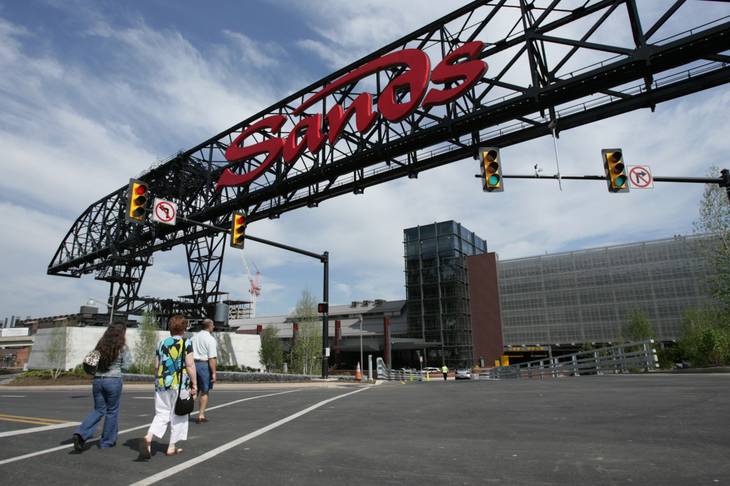BETHLEHEM — For the past six years, Sands Casino in Bethlehem has developed a reputation for giving away thousands of little plastic cards loaded with free slot-machine money each day.
It's a policy that's helped make the Sands Pennsylvania's biggest draw for out-of-state gamblers, but under Gov. Tom Wolf's proposed budget, it's one the South Side gambling hall may have to pay dearly to continue.
Wolf is looking to extract another $51 million a year out of the state's casinos, and the biggest part of that — roughly $12 million annually — would come from the Sands in Bethlehem.
That's because no casino uses free slot-machine money — and the tax break that comes with it — to lure people in the way Sands does.
"No one else is even close," said Richard McGarvey, spokesman for the Pennsylvania Gaming Control Board. "Sands' use of promotional play as a marketing tool has led all casinos since they opened in 2009."
But will it continue if the state takes a bite out of it?
"Anytime money is taken out, it's going to affect reinvestment in the property and the creation of future jobs," said Ron Reese, spokesman for Las Vegas Sands, parent company of Sands Bethlehem. "This proposal is bad for jobs in the Lehigh Valley and beyond. There's certainly no shortage of taxes already being paid."
The plan to get more money from casinos is part of a raft of new taxes that would close a $2 billion state deficit by increasing taxes on things such as personal income and cigarettes, while adding new taxes on things such as a cable television, movie tickets -- and yes, that free money Sands puts on tens of thousands of players' cards each week.
Pennsylvania's 12 casinos pay more state taxes than casinos in any other state. The $1.4 billion they pay is more than the 265 gambling halls in Nevada pay combined, largely because while Nevada casinos pay the state 6.75 percent tax on gross revenues, casinos in the Keystone State pay 55 percent of all their winnings to the state.
But that, Pennsylvania legislators argue, is because while Nevada set casino tax rates designed to promote tourism, Pennsylvania did it to generate money to reduce school taxes.
One offset to that has always been a tax credit that casinos could take for the promotional play money they give away to attract players into the casino.
For example, people leave behind roughly $8.5 million a week in Sands slot machines. However, roughly $3 million of that is free money Sands either loaded on its players' cards to get them in the door, or handed out in the form of free-play cards to thousands of bus riders who stream into the casino from New York and New Jersey each day.
The free money can range anywhere from the $10 occasional players get, to the $45 for people buying bus tickets from Asian neighborhoods such as Chinatown and Flushing, to the hundreds of dollars loaded weekly onto the cards of people who play a lot.
Under current state law, the Sands is not required to pay tax on that $3 million it gives away. The promotional-play tax break encourages casinos to market themselves, making them better able to compete against neighboring states with single-digit tax rates, such as New Jersey, casino executives argue.
Wolf's proposal would tap 8 percent of that giveaway money, pulling in an estimated $50.9 million statewide.
With the state facing a more than $2 billion budget deficit, most everyone will have to chip in to fill the void, and that includes casinos, said Wolf spokesman Jeff Sheridan.
"Pennsylvania has to find new sources of revenue. We're not going to cut our way out of this deficit," Sheridan said. "The governor is willing to sit down with [casino owners] to discuss the taxes, but if this isn't fixed, it's going to come out funding for things like schools and jobs."
The $12 million Sands would be taxed represents more than a month in profits, according to Sands' filings with the U.S. Securities and Exchange Commission.
No other Pennsylvania casino would suffer that kind of hit, but it's no less painful, said Mohegan Sun Casino CEO Michael Bean.
"It's a primary marketing tool for us, but there's a tipping point," Bean said. "It's going to cost us $3.7 million on top of the $125 million we already pay. At some point, if it's going to be a handicap, you're going to have to spend less. That's not good for us or the state."
Sands and Mohegan Sun are not alone in their opposition. A letter sent to Wolf last week, and signed by all 12 casinos, opposes the new tax. It argues that the tax will damage the state's gambling industry and the money it generates for the state, without actually generating the $50 million the governor wants to help balance the budget.
"This tax revenue will never be generated, though, because casinos will simply discontinue using promotional play in the same way and at the same levels," the joint letter states. "The Wolf plan would weaken Pennsylvania casinos in their efforts to compete."
State legislators have also proposed several other changes in the state's gambling laws that could bring the casinos more business, including allowing online gambling and slot machines in airports. But the proposed tax is the only one that all 12 of the state's casinos appear to agree on.
There remains a question of whether their unity will be needed. The new tax structure is in Wolf's 2016-17 budget, but state legislators still haven't approved Wolf's proposed 2015-16 budget.
